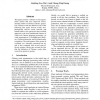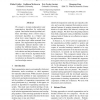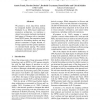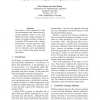ACL
2003
14 years 2 months ago
2003
This paper presents a Chinese word segmentation system that uses improved sourcechannel models of Chinese sentence generation. Chinese words are defined as one of the following fo...
ACL
2003
14 years 2 months ago
2003
We present a domain-independent topic segmentation algorithm for multi-party speech. Our feature-based algorithm combines knowledge about content using a text-based algorithm as a...
ACL
2003
14 years 2 months ago
2003
We present a novel, data-driven method for integrated shallow and deep parsing. Mediated by an XML-based multi-layer annotation architecture, we interleave a robust, but accurate ...
ACL
2003
14 years 2 months ago
2003
Recent work in Question Answering has focused on web-based systems that extract answers using simple lexicosyntactic patterns. We present an alternative strategy in which patterns...
ACL
2003
14 years 2 months ago
2003
Link detection has been regarded as a core technology for the Topic Detection and Tracking tasks of new event detection. In this paper we formulate story link detection and new ev...
ACL
2003
14 years 2 months ago
2003
We introduce a probabilistic noisychannel model for question answering and we show how it can be exploited in the context of an end-to-end QA system. Our noisy-channel system outp...
ACL
2003
14 years 2 months ago
2003
We present a probabilistic parsing model for German trained on the Negra treebank. We observe that existing lexicalized parsing models using head-head dependencies, while successf...
ACL
2003
14 years 2 months ago
2003
We present a novel approach for finding discontinuities that outperforms previously published results on this task. Rather than using a deeper grammar formalism, our system combi...
ACL
2003
14 years 2 months ago
2003
We present a language-independent and unsupervised algorithm for the segmentation of words into morphs. The algorithm is based on a new generative probabilistic model, which makes...
ACL
2003
14 years 2 months ago
2003
We introduce a MetaGrammar, which allows us to automatically generate, from a single and compact MetaGrammar hierarchy, parallel Lexical Functional Grammars (LFG) and Tree-Adjoini...




